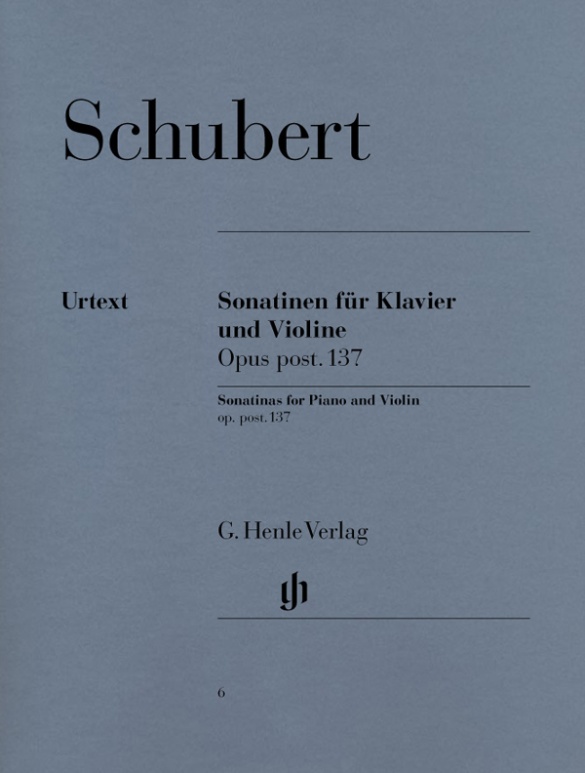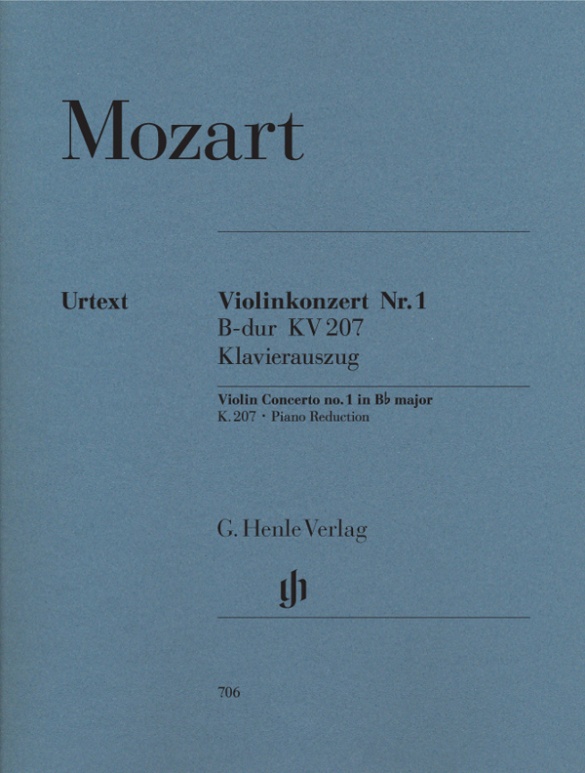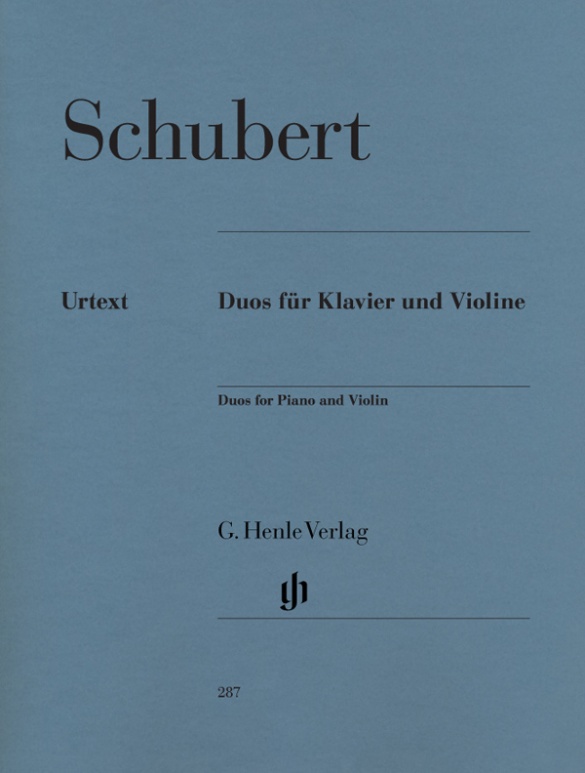

Franz Schubert
Duos for Piano and Violin
Schubert’s three grand duos for violin and piano occupy pride of place among his foremost works. In the A major Sonata D 574 of summer 1817 he continued to elaborate what was still a simple interplay of the violin and piano in the violin sonatinas (see HN 6) and reached his greatest mastery here. He increased the intensity of his writing into genuine virtuosity in the b minor Rondo D 895 composed in late 1826. The critics of Schubert’s day were already praising “the bold master of harmony” and “the fiery fantasy” of the piece. In the Fantasie in C major D 934, written one year later, Schubert brackets an Andantino with Variations on the song “Sei mir gegrüsst” D 741 with sections that are tastefully interwoven with the theme of the lied.
Content/Details
(Explanation)
About the Composer
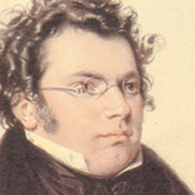
Franz Schubert
He is not only the inaugurator of the art song and its most important composer in the nineteenth century, but he also realized a compositional concept in his instrumental works that opposed Viennese Classicism. Underlying the “heavenly length” of his works is a configuration of time that does not function according to the principle of motivic development, but addresses the notion of lingering; modifications occur mostly not in continuous unfolding, but through sudden eruptions. His ornate songs contradict the ideal of simplicity in the Lied aesthetics of his time, and provide the basis for the art song of the nineteenth century, regarded as they were as exemplary by subsequent generations of composers; they are defined by complex harmonies, an integration of the idioms of instrumental music, semantic models, and a new relationship between text and music in which the poem as a whole is interpreted through the composition, rather than just through word painting. His immense oeuvre in spite of his brief life comprises 600 songs, including his two famous song cycles; seven complete and several unfinished symphonies (including the “Unfinished” in B minor); other orchestral works; numerous pieces of chamber music; fourteen complete and several unfinished piano sonatas as well as other piano pieces; dances for piano and four-hand works; six masses and other sacred compositions; numerous pieces for choir or vocal ensemble, especially for male voices. Although he also contributed to every genre of music theater and his friends predicted a career for him in opera, only two of his ten finished operas were performed during his lifetime, as was the incidental music to “Rosamunde.”
| 1797 | Born in Himmelpfortgrund near Vienna on January 31, the son of a teacher. First piano lessons from his brother Ignaz, violin lessons from his father at age eight. |
| from 1808 | Choirboy in the Imperial Chapel; attends the imperial and royal boys choir school (“Stadtkonvikt”), playing violin in its orchestra. Lessons from Antonio Salieri, who attempts to win over the boy enamored with Mozart, Haydn, and Beethoven to Italian opera. First surviving compositions. |
| 1811 | Composition of his first song, “Hagars Klage.” |
| 1813–14 | Attends the pedagogical secondary school, after which he teaches in his father’s school. |
| 1813/14 | Composition of the magical opera “Des Teufels Lustschloss” and the Symphony No. 1 in D major in classical form. |
| 1814 | Composition of the Mass in F Major, D 105. He writes songs, which he groups by their poets, e.g. Matthisson and Goethe, including “Gretchen am Spinnrade,” which marks the birth of the art song. |
| 1815 | Composition of the musical comedy “Claudine von Villa Bella” after Goethe and “Der vierjährige Posten.” Completion of the Symphony No. 2 in B-flat major and composition of the Symphony No. 3 in D major as well as the Masses in G major and No. 3 in D major; the song “Erlkönig,” among others. |
| 1816 | Composes 110 songs, the Symphonies No. 4 in C minor and No. 5 in B-flat major, and the Mass in C major. He leaves his parents’ home, suspends his position as teacher, and moves in with Schober. |
| 1817 | Sixty songs, including “Der Schiffer,” “Ganymed,” “An die Musik,” “Die Forelle,” “Gruppe aus dem Tartarus,” “Der Tod und das Mädchen.” Gradually his compositions are performed (his oeuvre already comprises around 500 works). Returns to his parental home. |
| 1818 | He teaches the daughters of Count Johann Karl Esterházy. Composition of four-hand piano pieces. |
| around 1819 | Composition of the Piano Quintet in A major (“Trout” Quintet). |
| 1820 | Premiere in Vienna of the melodrama “Die Zauberharfe” and the musical comedy “Die Zwillingsbrüder.” The song “Frühlingsglaube,” among others. |
| 1821 | First Schubertiade: a convivial musical- and literary evening meeting of Schubert’s circle of friends. Publication of the songs “Erlkönig” and “Gretchen am Spinnrade” as well as other Goethe songs and 36 dances. |
| 1821–22/54 | Composition/premiere of “Alfonso und Estrella,” one of the early through-composed German operas. |
| 1822 | Completion of the Mass in A-flat major; Symphony No. 7 in B minor (“Unfinished”); Wanderer Fantasy in C major for piano, which unites in one movement the four different characters of symphonic movements. |
| 1823 | Composition of the musical comedy “Die Verschworenen” (premiere in Frankfurt am Main in 1861), the heroic-Romantic opera “Fierrabras” (premiere in Karlsruhe in 1897), and the incidental music to “Rosamunde,” which is premiered in Vienna. Song cycle “Die schöne Müllerin,” songs “Auf dem Wasser zu singen,” “Lachen und Weinen,” among others; Piano Sonata in A minor, D 784. |
| 1824 | Once more teacher of the children of Count von Esterházy. String Quartet in D minor (“Death and the Maiden”). “Wandrers Nachtlied” (“Über allen Gipfeln ist Ruh”). The piano sonata takes on greater importance. |
| 1825 | Long holiday travels, including to Gmunden-Gastein, where he composes the Great Symphony in C major (No. 9 or No. 8), in which he considerably expands classical form (e.g. horn motto at the beginning, configuration of time). |
| 1827 | Song cycle “Winterreise” (contrasts dream sequences with reality); German Mass; four Impromptus for piano; Piano Trios in B-flat major, D 898, and E-flat major, D 929. |
| 1828 | Publication of the “Six Moments Musicaux” for piano. Composition of the last three piano sonatas in C minor, A major, and B-flat major (the latter with a tendency towards the esoteric), the sonata movement in A minor (“Lebensstürme”), the Mass in E-flat major. “Thirteen Songs after Poems by Rellstab and Heine” (posthumous “Schwanengesang,” “Swan Song”). In March, a concert dedicated to only his own music. Death in Vienna on November 19. |
About the Authors

Ernst Herttrich (Editor)
Dr. Ernst Herttrich, born in 1942 in Würzburg, read musicology, history, German and theology at the universities in Würzburg and Cologne. In 1970 he earned his doctorate in Würzburg with a study of the expression of melancholy in the music of Mozart.
From 1970 to 1990 he was an editor at G. Henle Publishers in Munich, after which he was Head of the Beethoven Complete Edition for over 15 years. In 1999 he took over as Head of the Beethoven-Haus Publishers, and from 2001 was made Head of the Beethoven-Archiv, the research centre at the Beethoven-Haus.
He has been a visiting professor at Meiji Gakuin University in Tokyo and has undertaken several lecture tours both there and to Kyoto. His research interests include source studies, editorial techniques and music history. Herttrich’s publications include “Beethoven. Liederkreis an die ferne Geliebte” (Bonn 1999) and “Ludwig van Beethoven. Biographie in Bildern” (Bonn, 2000). Herttrich has edited over 100 Urtext editions for G. Henle Publishers.
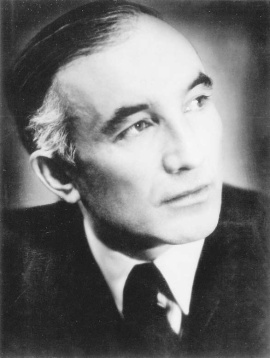
Hans-Martin Theopold (Fingering Piano)
Prof. Hans-Martin Theopold, was born to a pastor’s family in Detmold on 22 April 1904, the youngest of five children. Even as a child he often played the organ in the “Marktkirche” and soon began to take piano lessons with Theodor Vehmeier. At the age of 17 he made his debut at the Landestheater in Detmold with Ludwig van Beethoven’s Piano Concerto in C major under Friedrich Quast (Herford). Following the successful completion of his schooling at the Gymnasium Leopoldinum in Detmold, he went on to study music and piano (main subject): from 1922–23 at the “Württembergische Hochschule für Musik” in Stuttgart (with Max Pauer, 1866–1945) and then from 1923–1928 at the “Staatliche Akademische Hochschule für Musik” in Berlin-Charlottenburg (with Richard Rössler, 1880–1962, and Waldemar Lütschg, 1877–1948). After completing his piano studies (graduating with “very good”) in 1928, he began an active solo career both at home and abroad (USA, Switzerland, Scandinavia, the Baltic states, the Balkans). As a member of the Chamber Music Association of the State Opera in Berlin (from 1933) he also gave countless chamber music concerts, including ones with his violin partner Gustav Havemann (1882–1960).
In the 1930s, audiences and the press alike raved about Theopold’s extraordinary gifts as a pianist: “This young player has it in him to soon become one of the best players in Germany. A superior technique, a wonderful singing piano tone, the strength of a Titan, but not at all hard due to the incomparably gentle elasticity of his touch” [Münchener Zeitung, 21 November 1933]. – “H.M. Theopold gave convincing proof of his splendid pianistic ability in an extremely gripping sonata with a modern idiom by Alban Berg, but predominantly in Schubert’s […] Wanderer Fantasy, which he played with a polished technique and creative power” [Weser-Zeitung, 21 December 1932]. Theopold was awarded several prizes, including the “Grotrian-Steinweg-Preis” in 1928.
In 1937 Theopold became a teacher for the piano (main subject) at the “Bayerisches Staatskonservatorium der Musik” in Würzburg. In 1939 he married Irene Tatjana Wülfing, who was from Moscow. From 1943 he became head of the piano master-class at the “Nordische Musikschule” in Bremen, although this was interrupted by the events of the war. Following his return from a prisoner of war camp, Theopold gave concerts and taught although he did not hold a permanent position. From 1955–1956 he was acting head of the piano master-class at the “Bergisches Landeskonservatorium” in Wuppertal, finally being appointed Professor for Piano on 1 April 1956 at the “Staatliches Institut für Schul- und Volksmusik” in Detmold, later at the “Nordwestdeutsche Musikakademie Detmold” (today “Hochschule für Musik Detmold”), where he taught for decades. On 30 September 1969 he retired. “His students extol his pedagogical gifts. […] Humour, charm, helpfulness and kind-heartedness moderate the strictness of his professional ethos as a musician and teacher” (Lippische Rundschau, 23 April 1969; see also: Lippische Landeszeitung 22 April 1969 on the occasion of Theopold’s 65. birthday: “Prof. Theopold, a modest but at the same time energetic man, is an enthusiastic teacher”). Theopold died in Detmold in 2000.
Contact with Günter Henle was established directly after the publishing house was founded, when Theopold thanked the publishers with great enthusiasm for its first Urtext editions. His extensive correspondence with the publishing house was bequeathed to the Lippische Landesbibliothek in 2014 to ensure its long-term accessibility to the public. The letters testify not only to Theopold’s great interest in musical sources and text questions but also to his initial strict refusal (!) of fingerings in text-critical editions such as these: “For fingerings are and remain something individual no matter what their quality” (letter to Günter Henle from 26 May 1949 {publishing house archives}). Günter Henle was not, however, to be swayed and stressed the necessity of fingerings in his Urtext editions: “It is better to publish the Urtext […] with fingerings that are not necessary for a few individuals, or that might even, I admit, be considered irritating here and there” (letter to Hans-Martin Theopold of 17 September 1953).
It was only in 1955 that Theopold accepted Günter Henle’s offer of contributing fingerings for an Urtext edition that was in the process of being prepared by way of trial. (HN 74, Schubert, Complete Dances for Piano, Volume 1). Following this, Theopold was commissioned to write the fingerings for nearly all of the publishing house’s new editions in quick succession. Günter Henle, himself a good pianist, greatly valued Theopold’s fingerings, and also the many suggestions regarding the musical text in question. In addition, Theopold was always very reliable, thorough and conscientious – something that is not unimportant with editorial work!
Thus to date Hans-Martin Theopold has provided the fingerings for the greatest number of Henle Urtext editions by far – 226 editions (!) in total.
We would like to thank Mrs Margot Theopold and the Hochschule für Musik in Detmold for their great support in providing biographical material.
G. Henle Verlag
Product Safety Informations (GPSR)

G. Henle Verlag
Here you can find the information about the manufacturer of the product.G. Henle Verlag e.K.
Forstenrieder Allee 122
81476 München
Germany
info@henle.de
www.henle.com
recommendations
autogenerated_cross_selling
Further editions of this title


